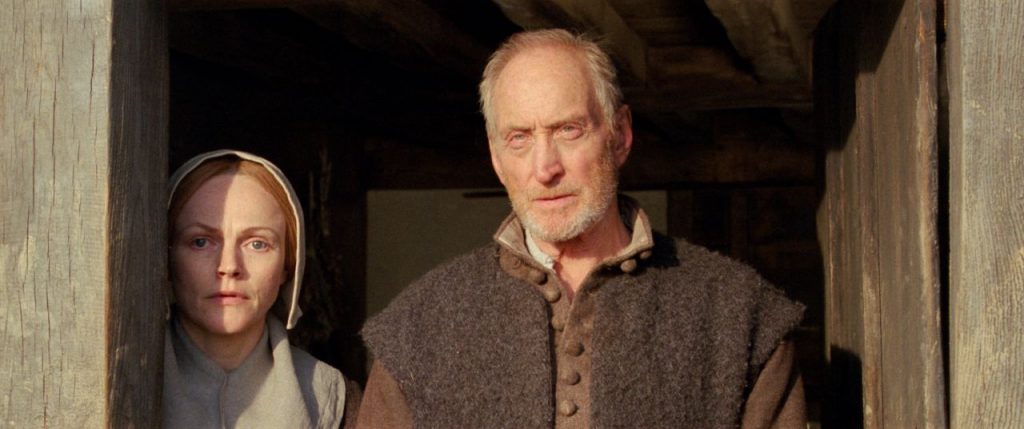It’s been well over a decade since Brit filmmaker Thomas Clay’s last release. Back in the 2000s, Clay impressed on the film festival circuit with the likes of Soi Cowboy and The Great Ecstasy of Robert Carmichael, two disparate films that were as impressively directed as they were hard to watch.
By 2016 he was ready to return, writing and directing a story set in 18th century Shropshire, and while it doesn’t bode well that Clay’s latest has spent over three years in post-production (he apparently ran out of budget), the writer/ director/ editor/ composer has managed to cobble together a version worthy of release.
It’s 1657 in the west of England where John Lye (Charles Dance) is living out his days on a remote farm with wife Fanny (Maxine Peak) and son Arthur (Zak Adams). John is a domineering, god-fearing man, a former captain in Oliver Cromwell’s army, who keeps his family in check should they dare to show any enjoyment in life, by beating pleasure straight out of them.
Fanny, for what it’s worth, is happy with the arrangement. A former servant, she respects John and appreciates the relative freedom he has afforded her, even if it comes at the cost of genuine happiness.
The family find their simple life disturbed one morning when, returning from church, they find a young couple seeking solace in their barn. Initially, Thomas (Freddie Fox) and Rebecca (Tanya Reynolds) present themselves as travellers, beaten and robbed on their journey, garnering sympathy and solace from the Lyes.
However, the young pair don’t quite seem to have as much respect for the Lord’s word as John. For in the time of Oliver Cromwell, there was a rise in dissent against the church. Ranters, as they were known, were either heretical children of the devil, or free-spirited hippies. And the visiting pair are definitely the latter.
Thematically, Fanny Lye Deliver’d has a lot going on. Whether it’s the repression of women – the home invaders bring more enlightenment than violence, offering Fanny an opportunity to grow beyond the shackles of her marriage – or the horrors of war. With intentional links to 60 and 70s folk horror cinema, in particular Witchfinder General, this plays out like a low-fi western, only the frontier is a farm in Shrewsbury, not a homestead on the Great Plains.
As talented as Clay clearly is, there’s a sense that perhaps he’s stretched himself a little far here. The cast deliver huge mouthfuls of period, biblical dialogue, and with Clay editing his own work, those scenes tend to feel like a stage play. Meanwhile the score, which Clay also wrote, regularly bears little relationship to the on-screen events, or at least, compound the uneven tone the film often strikes.
Along with the costume department and the custom-built farm set where the entire film takes place, the cast seem to be one of the few areas where Clay relinquishes control. Given his penchant for playing angry Charles Dance characters, it’s refreshing to hear Charles Dance affect an accent that’s distinctly Charles Dance, only Charles Dance from the West Country. And he doesn’t stop there – Dance literally throws himself into the role. He seems up for it in a way we’ve not seen from the actor since he realised the value of playing Charles Dance as a grumpy old man in period dramas.
However, despite his and Freddie Fox’s best efforts (Fox really goes for it as the hippy with an attitude, albeit one who looks like a Shoreditch hipster), it’s fitting that Maxine Peak will take the plaudits for her efforts as the titular Fanny. Repressed and understated, she’s on the most important journey of all, even if she is stuck indoors for most of it.
Where Fanny Lye ends up is what makes the journey and the sudden, shocking moments of violence (Clay must surely have Ben Wheatley on speed dial for advice) worthwhile. There’s just a nagging sense that, if he allowed a few more cooks into his kitchen, Thomas Clay would have delivered a great film, rather than an interesting one.
